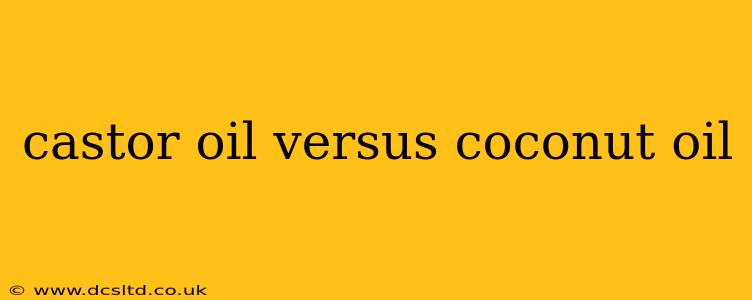Choosing between castor oil and coconut oil can feel overwhelming, given their diverse applications and touted benefits. Both are natural oils with unique properties, making them valuable additions to your health and beauty routine. However, understanding their differences is key to making informed choices. This comprehensive guide will explore the distinct characteristics, uses, and potential benefits of each oil, helping you decide which one best suits your needs.
What are the main differences between castor oil and coconut oil?
The primary difference lies in their fatty acid composition. Castor oil is predominantly composed of ricinoleic acid, a unique fatty acid known for its anti-inflammatory and purgative properties. Coconut oil, on the other hand, is rich in medium-chain triglycerides (MCTs), including lauric acid, capric acid, and caprylic acid, which offer distinct benefits related to energy metabolism and antimicrobial action. This fundamental difference in their chemical makeup translates to vastly different applications and effects on the body.
What are the benefits of using castor oil?
Castor oil's unique properties make it beneficial in several ways:
-
Laxative Effects: Ricinoleic acid stimulates bowel movements, making castor oil a traditional remedy for constipation. However, it's crucial to use it cautiously and under professional guidance, as overuse can lead to dehydration and electrolyte imbalances.
-
Skincare Applications: Many use castor oil for its purported ability to improve skin hydration and potentially soothe conditions like eczema or psoriasis. Its thick consistency makes it suitable as a carrier oil for other essential oils. However, individual results may vary.
-
Hair Care: Some find castor oil beneficial for promoting hair growth, though scientific evidence supporting this claim is limited. Its thick texture can also condition and add shine to hair.
-
Lubricant Properties: Castor oil's viscosity has led to its use as a lubricant in various industrial and mechanical applications. This shouldn't be confused with its topical or internal use.
What are the benefits of using coconut oil?
Coconut oil's MCT content contributes to its diverse benefits:
-
Culinary Use: Coconut oil's flavor profile makes it a popular cooking oil in many cuisines. However, its high saturated fat content should be considered as part of a balanced diet.
-
Skin Moisturizer: Coconut oil's moisturizing properties make it a popular ingredient in skincare products and as a standalone moisturizer. Its antimicrobial properties may also help prevent skin infections.
-
Hair Conditioner: Many use coconut oil as a hair mask to improve hair health, shine, and manageability. Similar to its skincare applications, its antimicrobial properties might be beneficial for scalp health.
-
Oral Health: Some studies suggest coconut oil pulling might improve oral health by reducing plaque and bacteria, though more research is needed to confirm these benefits conclusively.
Is castor oil good for hair growth?
While anecdotal evidence suggests castor oil might promote hair growth due to its fatty acid profile and potential to improve scalp circulation, robust scientific evidence is still limited. More research is needed to conclusively determine its efficacy in stimulating hair follicle growth.
Is coconut oil good for weight loss?
Coconut oil's MCTs are rapidly metabolized, potentially leading to increased energy expenditure. However, coconut oil is still high in calories, so its impact on weight loss depends significantly on overall calorie intake and lifestyle factors. It's not a magic bullet for weight loss and should be incorporated into a holistic weight management plan.
Which oil is better for cooking?
Coconut oil's flavor and high smoke point make it suitable for various cooking methods, although its saturated fat content warrants mindful consumption as part of a balanced diet. Castor oil is not generally recommended for cooking due to its high viscosity and potential toxicity at high temperatures.
Which oil is better for skincare?
Both oils offer moisturizing benefits for skincare. Coconut oil is generally better tolerated by sensitive skin, while castor oil's thicker consistency might be more suitable for dry, rough patches or as a carrier oil for other beneficial ingredients. Individual preferences and skin type will play a significant role in determining which oil is "better."
Conclusion
Castor oil and coconut oil offer distinct benefits and applications. Castor oil's ricinoleic acid contributes to its laxative and potential anti-inflammatory properties, while coconut oil's MCTs provide energy, moisturizing, and potential antimicrobial benefits. The "better" oil depends entirely on your specific needs and intended use. Always consult with a healthcare professional before using either oil for medicinal purposes, especially internally.
